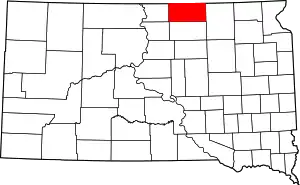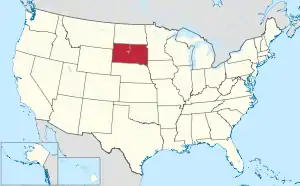McPherson County, South Dakota
McPherson County is a county in the U.S. state of South Dakota. As of the 2020 census, the population was 2,411.[1] Its county seat is Leola.[2]
McPherson County | |
|---|---|
 McPherson County Courthouse | |
 Location within the U.S. state of South Dakota | |
 South Dakota's location within the U.S. | |
| Coordinates: 45°46′N 99°13′W | |
| Country | |
| State | |
| Founded | 1873 (created) 1884 (organized) |
| Named for | James B. McPherson |
| Seat | Leola |
| Largest city | Eureka |
| Area | |
| • Total | 1,152 sq mi (2,980 km2) |
| • Land | 1,137 sq mi (2,940 km2) |
| • Water | 15 sq mi (40 km2) 1.3% |
| Population (2020) | |
| • Total | 2,411 |
| • Estimate (2022) | 2,395 |
| • Density | 2.1/sq mi (0.81/km2) |
| Time zone | UTC−6 (Central) |
| • Summer (DST) | UTC−5 (CDT) |
| Congressional district | At-large |
| Website | mcpherson |
History
The county was created in 1873 and organized in 1884.[3] It is named for American Civil War General James B. McPherson.[4]
Geography
McPherson County lies on the north line of South Dakota. The north boundary line of McPherson County abuts the south boundary line of the state of North Dakota. Its terrain consists of rolling hills, largely devoted to agriculture, and dotted with small lakes and ponds.[5] The terrain generally slopes to the south and east.[6] The county has a total area of 1,152 square miles (2,980 km2), of which 1,137 square miles (2,940 km2) is land and 15 square miles (39 km2) (1.3%) is water.[7]
The Samuel H. Ordway Jr., Memorial Prairie, a 7,800-acre (3,200 ha) grassland owned by The Nature Conservancy on the south side of South Dakota Highway 10 about 10 miles (16 km) west of Leola, is home to a bison herd.[8][9]
Major highways
Adjacent counties
- McIntosh County, North Dakota - north
- Dickey County, North Dakota - northeast
- Brown County - east
- Edmunds County - south
- Walworth County - southwest
- Campbell County - west
Protected areas[5]
- Elm Lake State Game Production Area
- Moscow State Game Production Area
- Morlock State Game Production Area
- North Jackson State Game Production Area
- Odessa State Game Production Area
- Pfeiffle-Neuharth State Game Production Area
- Rath State Game Production Area
- Rosenthal State Game Production Area
- Schock State Game Production Area
- Schumacher State Game Production Area
- Simpson State Game Production Area
- School State Game Production Area
- South Jackson State Game Production Area
- Stout State Game Production Area
- Wageman State Game Production Area
- Wolff State Game Production Area
Lakes[5]
- Crompton Lake
- Elm Lake (partial)
- Eureka Lake
- Feinstein Lake
- Hausauer Lake
- Heufel Lake
- Klooz Lake
- Long Lake
Demographics
| Census | Pop. | Note | %± |
|---|---|---|---|
| 1890 | 5,940 | — | |
| 1900 | 6,327 | 6.5% | |
| 1910 | 6,791 | 7.3% | |
| 1920 | 7,705 | 13.5% | |
| 1930 | 8,774 | 13.9% | |
| 1940 | 8,353 | −4.8% | |
| 1950 | 7,071 | −15.3% | |
| 1960 | 5,821 | −17.7% | |
| 1970 | 5,022 | −13.7% | |
| 1980 | 4,027 | −19.8% | |
| 1990 | 3,228 | −19.8% | |
| 2000 | 2,904 | −10.0% | |
| 2010 | 2,459 | −15.3% | |
| 2020 | 2,411 | −2.0% | |
| 2022 (est.) | 2,395 | [10] | −0.7% |
| U.S. Decennial Census[11] 1790-1960[12] 1900-1990[13] 1990-2000[14] 2010-2020[1] | |||
2020 census
As of the census of 2020, there were 2,411 people.
2010 census
As of the census of 2010, there were 2,459 people, 1,025 households, and 632 families in the county. The population density was 2.2 inhabitants per square mile (0.85/km2). There were 1,418 housing units at an average density of 1.2 units per square mile (0.46 units/km2). The racial makeup of the county was 98.2% white, 0.2% Asian, 0.1% Pacific islander, 0.2% from other races, and 1.3% from two or more races. Those of Hispanic or Latino origin made up 1.0% of the population. In terms of ancestry, 74.5% were German, 17.7% were Russian, 7.3% were Norwegian, 6.7% were English, and 2.5% were American.
Of the 1,025 households, 19.5% had children under the age of 18 living with them, 54.1% were married couples living together, 4.3% had a female householder with no husband present, 38.3% were non-families, and 36.3% of all households were made up of individuals. The average household size was 2.06 and the average family size was 2.66. The median age was 50.8 years.
The median income for a household in the county was $31,923 and the median income for a family was $47,500. Males had a median income of $31,953 versus $27,941 for females. The per capita income for the county was $19,255. About 12.5% of families and 16.5% of the population were below the poverty line, including 21.3% of those under age 18 and 27.1% of those age 65 or over.
Communities
Census-designated places
Politics
Except during the 1924, 1928 and 1932 elections when anti-Prohibition sentiment by the county's German Lutheran populace turned the county against Calvin Coolidge and Herbert Hoover, McPherson County has been among the most overwhelmingly Republican in the country. Apart from these anomalous elections, the free silver-influenced 1896 election, and the 1936 Democratic landslide in the aftermath of Prohibition, the best performance by any Democrat has been Barack Obama’s 32 percent in 2008. In 1968[15] and 1980[16] McPherson was among the five most Republican counties in the country, and in 1964 it was rivalled only by neighbouring Campbell County and the famous Republican bastions of Hooker County, Nebraska and Jackson County, Kentucky as Barry Goldwater’s best county outside the former Confederacy.
| Year | Republican | Democratic | Third party | |||
|---|---|---|---|---|---|---|
| No. | % | No. | % | No. | % | |
| 2020 | 1,075 | 81.19% | 222 | 16.77% | 27 | 2.04% |
| 2016 | 892 | 78.45% | 192 | 16.89% | 53 | 4.66% |
| 2012 | 921 | 75.80% | 272 | 22.39% | 22 | 1.81% |
| 2008 | 915 | 66.55% | 441 | 32.07% | 19 | 1.38% |
| 2004 | 1,180 | 74.73% | 369 | 23.37% | 30 | 1.90% |
| 2000 | 1,073 | 75.72% | 295 | 20.82% | 49 | 3.46% |
| 1996 | 1,080 | 62.25% | 463 | 26.69% | 192 | 11.07% |
| 1992 | 945 | 53.94% | 478 | 27.28% | 329 | 18.78% |
| 1988 | 1,358 | 70.14% | 571 | 29.49% | 7 | 0.36% |
| 1984 | 1,813 | 81.08% | 418 | 18.69% | 5 | 0.22% |
| 1980 | 2,056 | 85.60% | 287 | 11.95% | 59 | 2.46% |
| 1976 | 1,662 | 70.22% | 693 | 29.28% | 12 | 0.51% |
| 1972 | 1,950 | 76.92% | 579 | 22.84% | 6 | 0.24% |
| 1968 | 2,105 | 80.34% | 389 | 14.85% | 126 | 4.81% |
| 1964 | 1,891 | 72.34% | 723 | 27.66% | 0 | 0.00% |
| 1960 | 2,354 | 79.26% | 616 | 20.74% | 0 | 0.00% |
| 1956 | 2,225 | 77.85% | 633 | 22.15% | 0 | 0.00% |
| 1952 | 2,915 | 86.99% | 436 | 13.01% | 0 | 0.00% |
| 1948 | 2,034 | 76.24% | 611 | 22.90% | 23 | 0.86% |
| 1944 | 2,290 | 84.81% | 410 | 15.19% | 0 | 0.00% |
| 1940 | 2,839 | 77.46% | 826 | 22.54% | 0 | 0.00% |
| 1936 | 1,921 | 54.81% | 1,556 | 44.39% | 28 | 0.80% |
| 1932 | 606 | 18.35% | 2,650 | 80.25% | 46 | 1.39% |
| 1928 | 1,234 | 45.52% | 1,468 | 54.15% | 9 | 0.33% |
| 1924 | 833 | 28.83% | 94 | 3.25% | 1,962 | 67.91% |
| 1920 | 1,470 | 72.92% | 112 | 5.56% | 434 | 21.53% |
| 1916 | 992 | 80.06% | 224 | 18.08% | 23 | 1.86% |
| 1912 | 0 | 0.00% | 327 | 32.86% | 668 | 67.14% |
| 1908 | 785 | 81.86% | 157 | 16.37% | 17 | 1.77% |
| 1904 | 727 | 77.84% | 144 | 15.42% | 63 | 6.75% |
| 1900 | 898 | 74.15% | 297 | 24.53% | 16 | 1.32% |
| 1896 | 512 | 58.25% | 361 | 41.07% | 6 | 0.68% |
| 1892 | 487 | 50.52% | 221 | 22.93% | 256 | 26.56% |
References
- "State & County QuickFacts". United States Census Bureau. Retrieved September 8, 2023.
- "Find a County". National Association of Counties. Retrieved June 7, 2011.
- "Dakota Territory, South Dakota, and North Dakota: Individual County Chronologies". Dakota Territory Atlas of Historical County Boundaries. The Newberry Library. 2006. Archived from the original on April 2, 2018. Retrieved March 30, 2015.
- Gannett, Henry (1905). The Origin of Certain Place Names in the United States. US Government Printing Office. p. 195.
- McPherson County SD Google Maps (accessed February 6, 2019)
- ""Find an Elevation" Google Maps (accessed February 6, 2019)". Archived from the original on May 21, 2019. Retrieved February 6, 2019.
- "2010 Census Gazetteer Files". United States Census Bureau. August 22, 2012. Retrieved March 28, 2015.
- Grove, Noel (December 1988). "Quietly Conserving Nature". National Geographic. 174 (6): 841.
- "Samuel H. Ordway, Jr., Memorial Prairie". The Nature Conservancy. Retrieved May 13, 2015.
- "Annual Estimates of the Resident Population for Counties: April 1, 2020 to July 1, 2022". Retrieved April 2, 2023.
- "U.S. Decennial Census". United States Census Bureau. Retrieved March 28, 2015.
- "Historical Census Browser". University of Virginia Library. Retrieved March 28, 2015.
- Forstall, Richard L., ed. (March 27, 1995). "Population of Counties by Decennial Census: 1900 to 1990". United States Census Bureau. Retrieved March 28, 2015.
- "Census 2000 PHC-T-4. Ranking Tables for Counties: 1990 and 2000" (PDF). United States Census Bureau. April 2, 2001. Archived (PDF) from the original on October 9, 2022. Retrieved March 28, 2015.
- David Leip. "1968 Presidential Election Statistics". US Election Atlas. Retrieved March 27, 2018.
- David Leip. "1980 Presidential Election Statistics". US Election Atlas. Retrieved March 27, 2018.
- Leip, David. "Atlas of US Presidential Elections". uselectionatlas.org. Retrieved April 15, 2018.